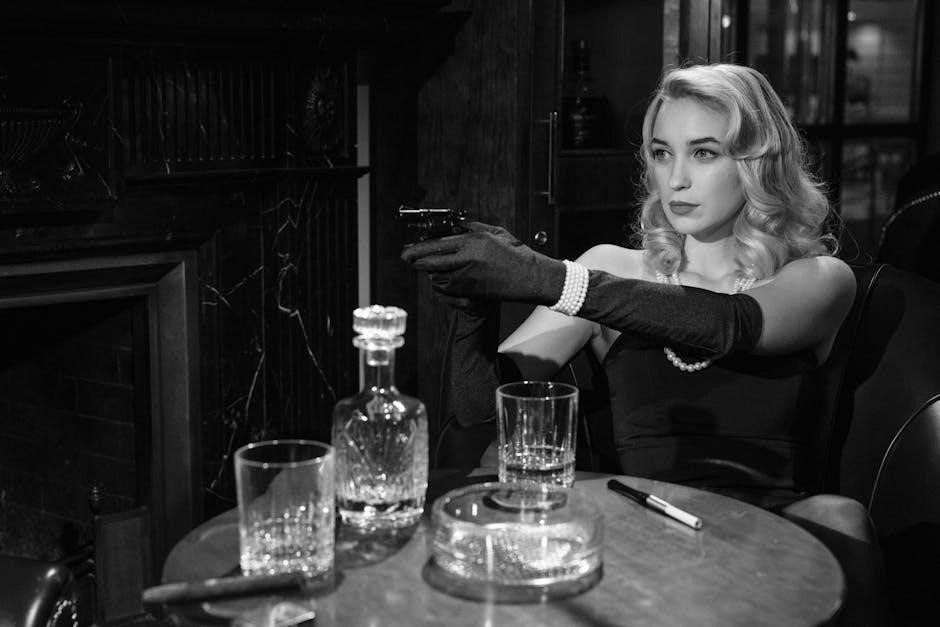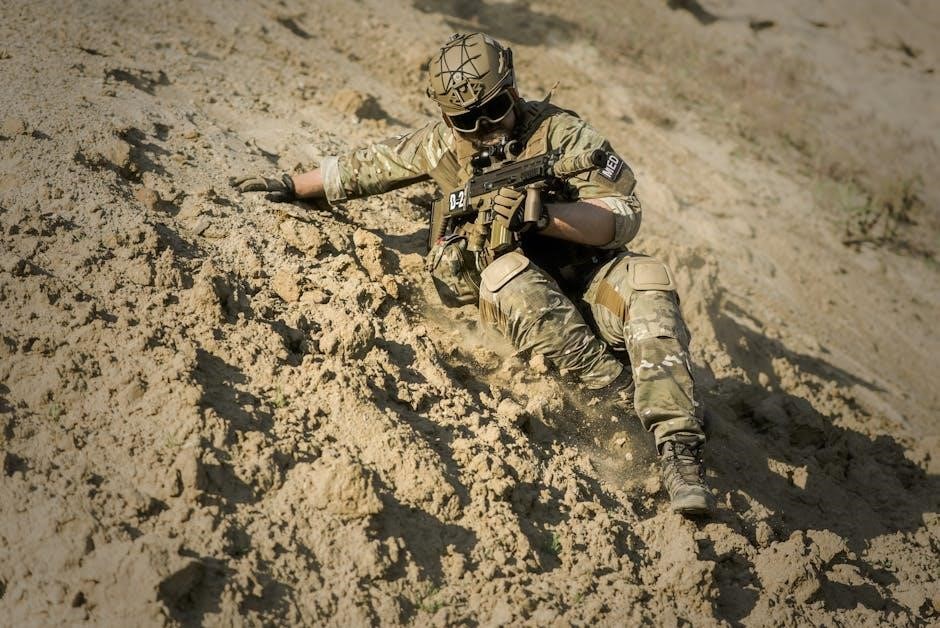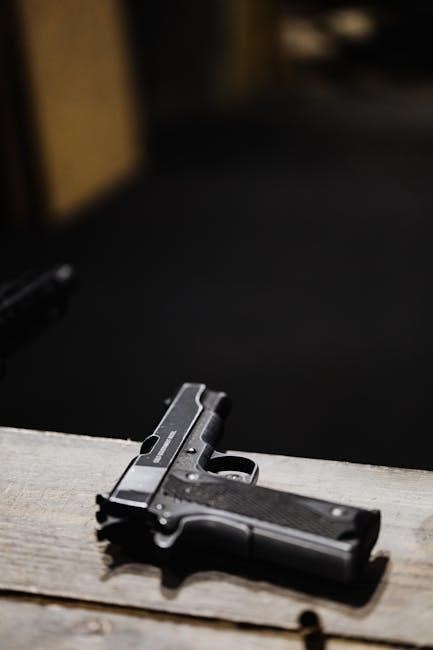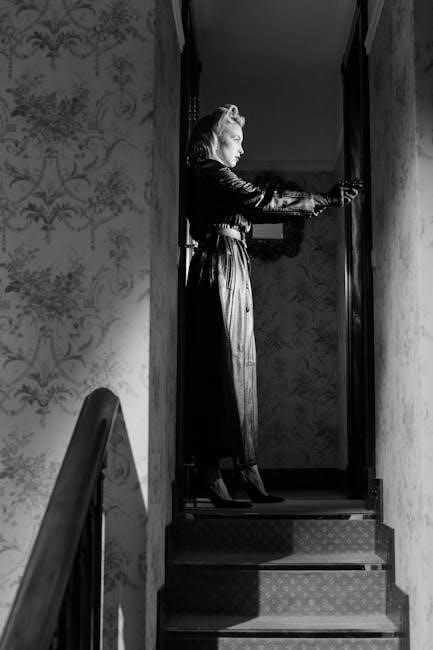Dalton Trumbo’s Johnny Got His Gun, published in 1939, is a powerful anti-war novel that explores the harrowing story of Joe Bonham, a soldier severely injured in World War I. The book delves into themes of isolation, trauma, and the brutality of war, offering a deeply human perspective on conflict and its consequences. Its vivid portrayal of physical and emotional suffering has made it a timeless critique of war, resonating with readers for generations.
Publication and Background
Johnny Got His Gun, written by Dalton Trumbo, was published in 1939 by J.B. Lippincott. Trumbo, inspired by the devastating realities of World War I and personal experiences of loss, crafted this anti-war novel. The book gained prominence for its raw portrayal of war’s horrors, resonating deeply with readers. Trumbo’s background, including the loss of his father and working-class struggles, influenced his writing, giving the novel a unique, empathetic voice. The publication coincided with rising tensions before World War II, making its anti-war message particularly impactful and timeless in its critique of conflict’s human cost.
Major Themes
Johnny Got His Gun explores themes of isolation, helplessness, and the absurdity of war, critiquing the dehumanizing effects of conflict and its profound impact on humanity.
Isolation and Helplessness

In Johnny Got His Gun, Joe Bonham’s severe injuries leave him trapped in a state of profound isolation and helplessness. Unable to move, speak, or connect with the outside world, Joe becomes a prisoner of his own body. His physical limitations amplify his emotional despair, as he struggles to comprehend his existence without arms, legs, or a face. The novel vividly portrays his internal torment, as Joe reflects on his past life and grapples with the absurdity of his current state. Trumbo uses Joe’s plight to highlight the dehumanizing effects of war, emphasizing the psychological toll of such extreme isolation and helplessness.
Anti-War Sentiment

Dalton Trumbo’s Johnny Got His Gun is a searing indictment of war, emphasizing its brutality and futility. Through Joe Bonham’s harrowing experience, Trumbo conveys the devastating consequences of conflict on individuals and humanity. The novel critiques the systemic dehumanization of soldiers, reducing them to mere tools of war. Trumbo’s anti-war sentiment is evident in his portrayal of the physical and emotional destruction inflicted on Joe, as well as the absurdity of political and military leaders orchestrating violence from a distance. The book serves as a powerful denunciation of war’s senseless carnage, urging readers to question the true costs of military conflict and its impact on human dignity.

Key Motifs
The novel explores motifs of isolation, physical trauma, and emotional suffering, highlighting the absurdity of war. Trumbo uses these elements to underscore the horrors and futility of conflict, emphasizing the human cost and loss of dignity.
Physical and Emotional Trauma
Joe Bonham’s severe injuries—loss of limbs, face, and sensory perception—symbolize the devastating physical toll of war. His emotional trauma is equally profound, as he grapples with isolation, helplessness, and despair. The novel vividly portrays the psychological impact of such catastrophic injuries, as Joe reflects on his lost identity and the meaning of life. Trumbo emphasizes the dehumanizing effects of war, illustrating how physical trauma exacerbates emotional suffering. Through Joe’s ordeal, the novel underscores the enduring human cost of conflict, blending visceral descriptions of pain with a deeply personal exploration of loss and resilience.
Historical Context
Dalton Trumbo’s Johnny Got His Gun, published in 1939, reflects the horrors of World War I and the interwar period’s political tensions, offering a stark critique of militarism and its human cost.

Influence of World War I
Johnny Got His Gun was deeply influenced by the devastation of World War I, which Dalton Trumbo viewed as a senseless and brutal conflict. The novel reflects the horrors of modern warfare, emphasizing the physical and emotional trauma endured by soldiers. Trumbo drew inspiration from real-life stories of severely injured veterans, highlighting the dehumanizing effects of war. The novel critiques the romanticization of military service, instead portraying war’s reality through Joe Bonham’s suffering. Set against the backdrop of World War I, the book serves as a powerful indictment of militarism and the exploitation of young soldiers by political and military leaders.

Literary Devices
Dalton Trumbo employs vivid imagery and symbolism to emphasize the physical and emotional trauma of war, creating a haunting narrative that underscores the novel’s anti-war message.
Symbolism
In Johnny Got His Gun, Dalton Trumbo uses powerful symbolism to convey the horrors of war and the loss of humanity. Joe Bonham’s mutilated body symbolizes the dehumanizing effects of conflict, while his facelessness represents the erasure of individuality in war. The hospital bed serves as a symbol of confinement and isolation, trapping Joe in a living nightmare. The communication system Joe devises, tapping out messages in Morse code, symbolizes resilience and the human spirit’s struggle for connection. These symbols underscore the novel’s anti-war message, highlighting the physical and emotional toll of combat on individuals and society.
Narrative Structure

Johnny Got His Gun employs a non-linear narrative structure, divided into three books, to reflect Joe Bonham’s fragmented consciousness. The story oscillates between Joe’s disorienting present in the hospital and his memories of the past, creating a sense of temporal dislocation. Trumbo uses this structure to build suspense and emphasize Joe’s growing awareness of his condition. The narrative shifts between vivid hallucinations, flashbacks, and moments of clarity, mirroring Joe’s psychological state. This unconventional structure underscores the chaos and disorientation of war, while also highlighting Joe’s desperate attempts to maintain his identity and humanity in the face of overwhelming trauma.

Protagonist Analysis
Joe Bonham, the protagonist, is a young soldier tragically wounded in World War I, losing his limbs and senses. His journey explores themes of isolation, despair, and resilience as he struggles to communicate and find purpose in a shattered existence.
Joe Bonham’s Journey
Joe Bonham, the protagonist of Johnny Got His Gun, undergoes a profound and harrowing transformation. As a young soldier, he enlists with idealism, only to be catastrophically injured in World War I, losing his limbs, face, and senses. Trapped in a hospital bed, Joe grapples with overwhelming isolation and helplessness, questioning the meaning of his existence. Through fragmented memories and internal monologues, Joe reflects on his past, revealing his humanity and the absurdity of war. His journey is marked by despair, resilience, and a desperate attempt to communicate, ultimately becoming a powerful symbol of war’s devastating consequences on the individual.

Antagonist Analysis
In Johnny Got His Gun, the antagonist is not a person but the oppressive system—military, government, and society—that perpetuates war and dehumanizes soldiers, leaving them shattered and forgotten.
The System as the Antagonist
In Johnny Got His Gun, the true antagonist is the oppressive system—comprising the military, government, and society—that perpetuates war and dehumanizes soldiers. This faceless entity traps Joe Bonham in a cycle of suffering, denying him dignity or escape. The system is indifferent to individual lives, prioritizing propaganda and nationalism over human welfare. It enforces conformity and silences dissent, leaving soldiers like Joe shattered and forgotten. Trumbo portrays this systemic oppression as the root of war’s horrors, emphasizing its role in stripping individuals of their humanity and reducing them to mere tools of conflict. The system’s inhumanity is the novel’s central critique.
Dalton Trumbo’s Background
Dalton Trumbo was born in Colorado and grew up in a working-class family. After losing his father at a young age, he moved to Los Angeles, where he worked the night shift at a bakery while attending college. Trumbo wrote prolifically, producing 88 short stories, six novels, and numerous movie reviews, all of which were initially rejected. His early struggles shaped his writing, which often reflected his anti-war and communist sympathies. Trumbo’s experiences and ideologies deeply influenced Johnny Got His Gun, cementing his reputation as a bold and unflinching literary voice.

Cultural and Historical Impact
Johnny Got His Gun has left a profound cultural and historical imprint as a powerful anti-war statement. Published in 1939, it resonated deeply during World War II and the Vietnam War, becoming a symbol of protest against militarism. The novel’s vivid depiction of war’s horrors influenced public perception and anti-war movements. It won the National Book Award in 1939, solidifying its literary significance. The book was also adapted into a film in 1971, further amplifying its message. Despite being banned in some regions due to its controversial themes, Johnny Got His Gun remains a timeless critique of war, continuing to inspire reflections on its human cost.
Johnny Got His Gun is a haunting anti-war novel by Dalton Trumbo, centering on Joe Bonham, a soldier catastrophically injured in World War I. The story unfolds through Joe’s fragmented consciousness, detailing his physical and emotional trauma. Trumbo masterfully explores themes of isolation, helplessness, and the absurdity of war, offering a searing critique of its brutality. The novel’s vivid portrayal of Joe’s struggles to communicate and find meaning in his shattered existence has made it a landmark of anti-war literature. Its unflinching honesty and emotional depth continue to resonate, providing a powerful commentary on the human cost of conflict.
Johnny Got His Gun remains a searing indictment of war and its devastating consequences. Through Joe Bonham’s harrowing story, Dalton Trumbo exposes the brutality and futility of conflict, emphasizing the human cost often overlooked in patriotic narratives. The novel’s unflinching portrayal of physical and emotional trauma, coupled with its exploration of themes like isolation and helplessness, ensures its enduring relevance. Trumbo’s work not only critiques war but also challenges societal apathy, urging readers to confront the realities faced by soldiers and victims. As a powerful anti-war statement, Johnny Got His Gun continues to resonate, offering a poignant reminder of the horrors of conflict and the value of human life.